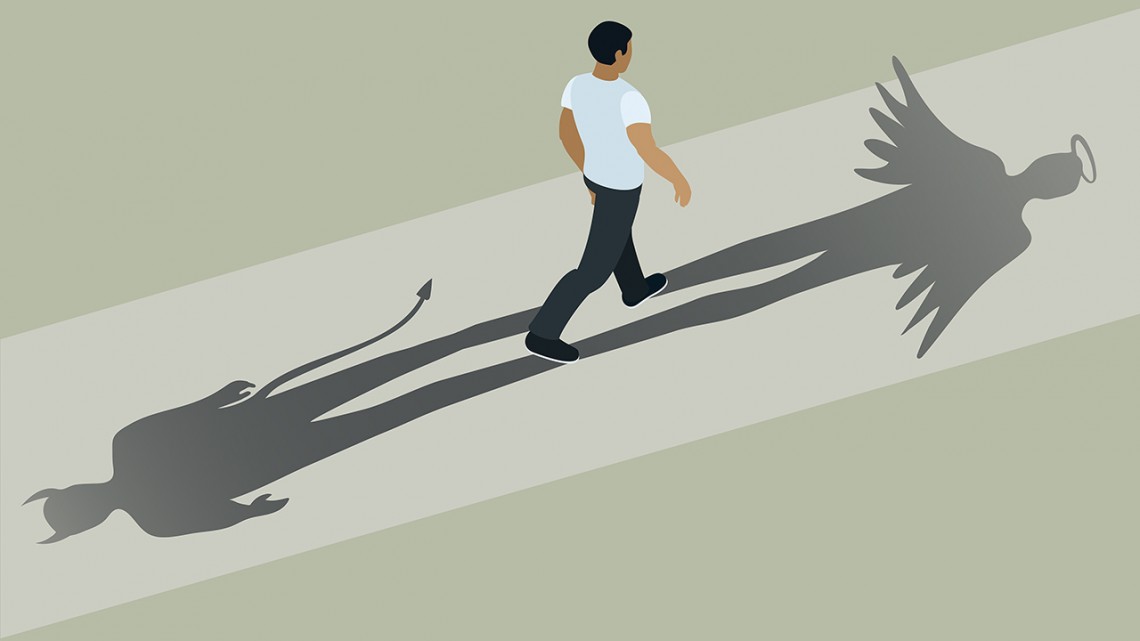
A choice may not feel like a choice when morality is at play
By Susan Kelley
In 2013, Muhammed Chohan was sitting in his car at a red light in Durban, South Africa, when he saw a thief smash the window of the car in front of him. The thief slapped the woman in the driver’s seat, grabbed her bag and started to run away.
Chohan suddenly had a decision to make. Would he stay put, as if nothing had happened? Or would he intervene?
He pulled over, leapt out of his car and chased the man. The thief escaped, but Chohan retrieved some of the woman’s possessions – including her great-grandmother’s gold ring – dropped by the thief during the chase.
Chohan later said, “When I noticed a young lady in need, I had no choice but to help.”
The anecdote was mentioned in a study that asked, why do people who clearly have a choice sometimes feel they have only one option?
Morality may be the answer, according to a new study by a Cornell expert in behavioral ethics and his colleagues.
When people consider a particular decision as moral in nature, they often don’t perceive they have options and pay less attention to alternative courses of action, the study found.
“A choice sometimes doesn’t feel like a choice at all when morality is involved,” said co-author Isaac Smith, assistant professor of management and organizations in the Cornell SC Johnson College of Business. “Morality can give us a sense of obligation that reduces our sense of choice.”
The study, “Does Deciding Among Morally Relevant Options Feel Like Making a Choice?”, was published in the November issue of the Journal of Personality and Social Psychology. Smith’s co-authors are Maryam Kouchaki of Northwestern University and Krishna Savani of Nayang Technological University, Singapore.
Smith and his colleagues conducted eight studies with a total of 2,217 participants. In each, they asked the participants to make real or hypothetical decisions that would be perceived by some to have moral implications. For example, participants were asked whether they viewed issues including gun control, smoking marijuana and abortion as moral. They then imagined scenarios in which they were asked to vote to ban firearms, to smoke marijuana and to advise a friend on whether she should abort her unwanted child.
People who viewed the issues as moral – regardless of which side of the debate they stood on – felt less of a sense of choice when faced with the decisions. “In contrast, people who made a decision that was not imbued with morality were more likely to view it as a choice,” Smith said.
The researchers saw this weaker sense of choice play out in the participants’ attention patterns. When deciding among morally relevant options displayed on a computer screen, they devoted less visual attention to the option that they ultimately rejected, suggesting they were less likely to even consider immoral options as viable alternatives in their decision-making, the study said.
Moreover, participants who felt they had fewer options tended to choose more variety later on. After deciding among moral options, the participants tended to opt for more variety when given the choice of seven different types of chocolate in an unrelated task. “It’s a very subtle effect but it’s indicative that people are trying to reassert their sense of autonomy,” Smith said.
Understanding the way that people make morally relevant decisions has implications for business ethics, he said: “If we can figure out what influences people to behave ethically or not, we can better empower managers with tools that might help them reduce unethical behavior in the workplace.”
However, he cautions managers to avoid overly moralizing issues. “If people don’t have a similar moral value set, then it can come across as a much stronger constraint, and a more oppressive strategy. So moral appeals can backfire,” Smith said. “But when used appropriately, they can be very effective.”
Media Contact
Get Cornell news delivered right to your inbox.
Subscribe
